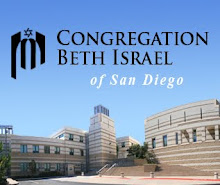Before the trip, I was a bit of a Birthright agnositic. As I understand it, Birthright's main goal is to connect young Jews to their Jewish identities, using a free trip to Israel as the vehicle. I was always skeptical because, as one who has spent a lot of time in Israel, I felt that ten days was not long enough, and that the participants are already too old. It's better to send teens and grab them early.
I think I have been convinced that I am am wrong about Birthright. While I wish that every American Jew would spend long trips in Israel, I did see a real community form in these short ten days. People who have not thought seriously about their Jewish identity since they were a kid, or ever, were engaging in true questions of meaning like: What does it mean to be a Jew? What is my connection to Israelis? Do I have a responsibility to live as a Jew?
I was also wrong about the age thing. Teenagers are not great with "meaning" questions, but young adults are trying to figure these things out, and we as a Jewish community have not helped them find Jewish answers. This past Shabbat afternoon, six of our participants chose to make questions like the aforementioned into their lives in serious ways by choosing to become "b'nei mitzvah." I put this in quotes because according to Jewish tradtion, one is automatically a Jewish adult at the age of thirteen, but our six never had the opportunity to affirm this. They were raised with little or no Judaism in the home, but they decided to stand up in the small synagogue in a small hotel in Tiberius and commit themselves to a Jewish life. They were looking for community, for meaning, for connection. Israel brought this out of them.
I have been moved many times by many things in Israel, but this was the most exceptional.






I too was changed by my recent trip to Israel even though it was not a Birthright trip. I agree that this age group is perfect because they hopefully have reached a point in their lives where they can make significant personal decisions and then have the independence and where with all to act upon those convictions. I think that the proof in the pudding is the post-Birthright activities that the participant engages in. A lot of what they do is also dependent on what the community has to offer and I think what your wife is doing is a significant part of that. I would really like to see this group more involved in multi-generational activities because I really feel that we can learn from each other.
ReplyDeleterabbi you brought a tear to my eyes
ReplyDeletewhat a trip
ReplyDelete